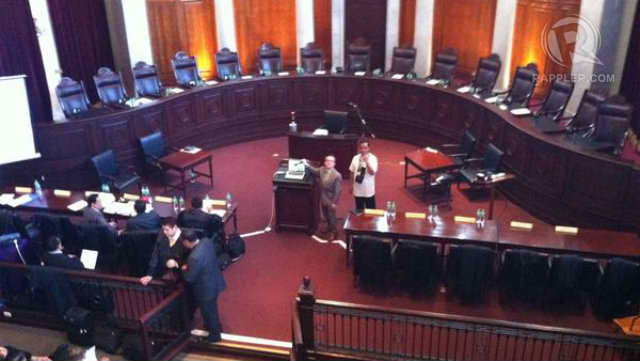SUMMARY
This is AI generated summarization, which may have errors. For context, always refer to the full article.

MANILA, Philippines (UPDATED) – Is it not an obligation of the state to protect private, ordinary citizens such as Chris Lao?
As 5 lawyers faced the Supreme Court on Tuesday, January 15, to question the Cybercrime Prevention Act of 2012, justices played devil’s advocate and asked questions that revolved around one theme: what’s the recourse of a citizen who is abused online?
Netizens, media organizations and other groups are against the law, saying it violates freedom of speech and privacy.
But Chief Justice Maria Lourdes Sereno and Justice Marvic Leonen noted that in the age of social media, users can immediately and easily post defamatory messages.
“They do not need editors, publishers, proofreaders,” Leonen told his former colleague, lawyer Harry Roque, who argued that the law’s provision on online libel is unconstitutional. (Leonen himself is on Twitter, @marvicleonen.)
Leonen, former dean of the UP College of Law, highlighted the differences between Article 360 of the Revised Penal Code (the provision penalizing libel) and Section 4(c)4 of Republic Act 10175 or the Cybercrime law.
Article 360 of the Revised Penal Code states that, “Any person who shall publish, exhibit, or cause the publication or exhibition of any defamation in writing or by similar means” should be held responsible for libel.
The liability covers “the author or editor of a book or pamphlet, or the editor or business manager of a daily newspaper, magazine or serial publication is responsible for the defamations contained therein to the same extent as if he were the author thereof.”
That’s not the case on Facebook and Twitter, Leonen pointed out. He added that messages disparaging others can quickly reach a number of people, citing popular Twitter users who have hundreds of thousands of followers.
“Is there not a state interest in coming in to remove the megaphones from individuals who are careless?” he asked.
Leonen used the example of Chris Lao, a UP law student who was mocked online in 2011 after a news footage of him driving through floods went viral. Lao – now a lawyer – was criticized on Facebook and Twitter.
Private vs public
Leonen emphasized that Lao is a private citizen.
But Roque explained that while private citizens should be defended against malicious online attacks, the cybercrime law’s Section 4(c)4 is too broad and vague that it may penalize people for just commenting online on acts of public officials.
Leonen said though that there is enough jurisprudence on libel committed against public figures.
Roque said that private citizens who are defamed can be sued under the existing provisions on libel in the Revised Penal Code. Thus there is no need for Section 4(c)4 in the Cybercrime law.
But Leonen said this would be costly for citizens. They would have to hire a “very expensive counsel” to comb through the provisions of “an archaic Revised Penal Code.”
Roque argued: “What we want is civil damages, no imprisonment for online libel. Online libel should be struck down for overbreadth and vagueness.”
Roque also pointed out that online libel under the law covers cybercafe owners and Internet service providers. He cited a “vague” provision: Section 4 (c)4 which defines libel as “the unlawful or prohibited acts of libel as defined in Article 355 of the Revised Penal Code, as amended, committed through a computer system or any other similar means which may be devised in the future.”
Justice Roberto Abad disagreed, saying Internet service providers are not liable for this offense, nor does the responsibility extend to online platforms like Twitter.
The other petitioners against the law, lawyers Rodel Cruz and JJ Disini, stressed the need for a court order or warrant before government can block access to computer data, what is known as the takedown clause.
They said a warrant is also needed to allow government to collect traffic data in real-time.
Disini said they recognize the state’s right to look at traffic data but asked that there be “judicial intervention.” Traffic data, Disini said, includes size of messages, information about incoming and outgoing calls, and incoming text messages.
Justice Antonio Carpio said this is similar to information found in phone bills. Even then, Carpio said a court warrant is needed for state agents to seize a citizen’s phone bills.
‘Good point’
Chief Justice Sereno said that not all collection of data required a court warrant. She cited the example of optical scanners on highways which record the plate numbers of vehicles passing by.
“You expect to traverse the highway and not have data of your vehicle collected?” she asked Disini, to which the lawyer conceded: “That’s a good point.”
The next oral arguments will be held on January 22, where the Office of the Solicitor General will present the government’s side.
The petitioners also asked the High Court to extend the temporary restraining order, which will lapse in February. Sereno said they will take note of this. – with reports from Purple Romero and Ayee Macaraig/Rappler.com
More on the Cybercrime law:
Add a comment
How does this make you feel?
There are no comments yet. Add your comment to start the conversation.